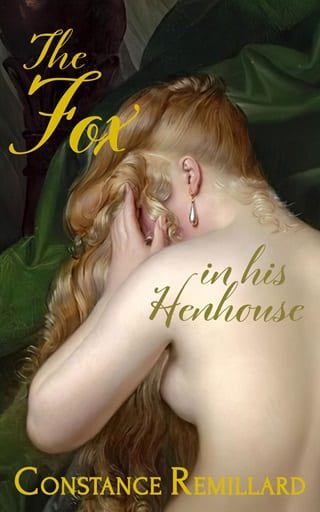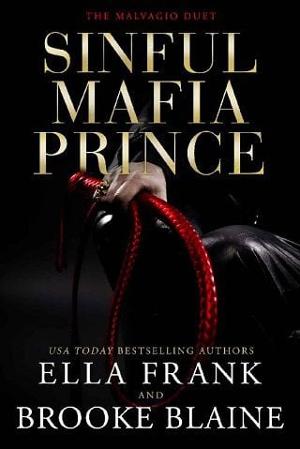Chapter 26
CHAPTER TWENTY-SIX
D earest Charles, Eleanor’s letter began as they all did. Wells settled into his seat by the fire to read.
No doubt Christmas at the Abbey was a sight to behold for all the effort you wrote of. Our own celebration was quiet, though John’s presence brought merriment this year. He truly is the sweetest man, and I admit I miss him already, though he sits here as I write. He leaves tomorrow as he believes it safe again to travel. Though I fear there is another reason he is now eager to leave, a reason you will think I should regret, but I do not. I regret it not a bit. I kissed him, you see, just his hand, nothing more. It was all very chaste. Only then he kissed me back, Charles, and it was glorious, his kiss! It was as if the world stopped and there were no other souls on earth but he and me.
You are surely angry, sister, but I do not care if you are. I must be honest with myself and with you. I am in love with John Cuthbert, and nothing you say will alter my feelings towards him. I do not know if he loves me in return, but even if he shouldn’t, it is the most remarkable, wonderful, feeling, Charles. Someday you will experience it too, I am sure, but until then believe me when I tell you nothing can compare to such a kiss. Nothing!
Wells paused in his reading, for it felt like a breach of confidence to read so intimate a declaration from Eleanor Merrinan regarding his steward, John Cuthbert. He was taken aback by both her passion and innocence; Charles had indeed managed to hide much from her sister. Yet Eleanor’s heartfelt sentiment towards Cuthbert also struck a nerve. Wells worried his steward might in truth be in love with the girl—Charles would not be pleased. Nor did he want John rushing into marriage, stolen from him when he needed him here at the Abbey. He was his righthand man. He trusted John with his life, could not imagine life without him, truth be told.
With a sigh he read on.
So that is my news, judge me as you see fit. I understand now why Mama left her family to be with Papa. There is no stronger pull in all the world, Charles. And only think, sister, had our parents not eloped, there’d be no you or me. So in the end, what is wrong and what is right is only our perception in the moment, is it not? I am not ashamed to have kissed John Cuthbert. No one can tell me something so wonderful could possibly be so wrong.
Write to me soon, Charles, or better yet, now that the snow is passable come see us, please. It would do Papa good, and as for me, I need you more than ever, for no one counsels so well as you. Only do not counsel me from John, I could not bear it. Do not tell me I am foolish and na?ve, as I know I am both and frankly do not care.
Love, Charles, cannot be ignored. I will embrace it.
Ever yours, Eleanor
Wells folded the letter, glad for once that Cuthbert did not read these missives too. Should he broach the matter with Charles, or let her come to him? He wasn’t sure how she’d react to her sister’s declaration, but he suspected that if he now forbade Cuthbert to visit Eleanor Merrinan the man would outright revolt. He’d known John long enough to recognize when not to cross him.
No. Any interference in this would have to come from Charles herself regarding her sister.
These Merrinan girls are trouble indeed, he thought to himself. And yet, for all the trouble they were, there was something about the two . . . It was absurd, almost, that he and John should both gravitate to these two sisters.
“Oi, sir, ’twere a humble celebration, but Miss Eleanor and her father are well stocked for winter. Had the snow not come on so hard I’d like as not’ve made me way back in time.”
Wells had called for Cuthbert to report on his absence. They were alone in the parlor as he did not wish their conversation overheard.
“John, I do not blame you for the storm. I wish only that you’d been here to witness the pudding debacle and Pinky’s wassail disgrace. I must say it was rather lively here that night.” Wells smiled to recall the evening.
Cuthbert eyed him closely. “And Miss Merrinan, sir? How’d she take all the upset? I imagine she were right peeved t’ see her hard work unravel afore her eyes.”
“She came around, John.” Wells smiled to himself. “I think she’s settled in nicely as housekeeper.”
“Has she now?” His man’s eyes sparked. “Think you’ve tamed her then, Yer Grace?”
Wells frowned at his steward’s needling. “Yes, John, I believe I have. She serves me well and willingly now in both capacities.”
Cuthbert snorted.
“And may I ask how you got along with her sister, the lovely Miss Eleanor, trapped as you were in that house with barely a fitting chaperone in her father?” It was time to pry.
“Fine, sir,” his steward grumbled, looking down.
“Nothing untoward happen, did it, John?”
“No, sir,” the man mumbled, clearly itching to leave.
“Good. Because if word got out that any man of mine took advantage of a village girl?—”
Cuthbert suddenly met Wellesley’s eyes. “Oi, and you’re one to talk.”
“John I am one to talk.” He remained stern. “My agreement with Charles is quite different and you know it.”
“Is it, sir?” Cuthbert’s gaze was hard. “Y’ stole a great deal more from her than she from you.”
Wellesley’s face darkened. “You forget your place, John.”
“Sure, Yer Grace.” Cuthbert did not back down. “Way I see it, though, y’ need remindin’ that you’ve a position t’ uphold here too. And if I recall, as lord o’ this here Abbey you’ve an even greater duty than my sort t’ be honorable to ladies.”
“A thief is hardly a lady, John,” Wells bit back, feeling provoked.
“’Course, Yer Grace, I thought her but a thief too at first, only by the time y’ took her honor, sir, y’ knew full well she were a lady.”
Cuthbert abruptly strode out, leaving Wells livid.
The very next day, Wells demanded his steward hand over Charles’s response to her sister. Cuthbert did, grudgingly.
Eleanor,
I scarce know what to write you, but I shall visit as soon as possible, only until then promise me you will not kiss John Cuthbert again. Swear it, Ellie, not until we’ve had a chance to discuss this change in you. Give me your word, sister, because it is a serious matter, more serious than you know, with greater repercussions than you know. And though you may think me innocent of such matters, I am experienced enough to have kissed a man and rued the day myself. But I shall leave that talk for when I see you.
Rued his kiss? Really? Wells sat up in his chair, gripping the letter tight.
I am grateful you and Father weathered the storm, and grateful Cuthbert thinks you well stocked in food and peat. I do not blame him or you, Ellie, for what happened over Christmas. I ask only that you not encourage him further. If he cares for you at all, he will keep his distance, respectably. I ask only that you also do the same. Would that I were home with you and not so far away! Mother would be so displeased with me right now, I cannot bear to think on it. She would be displeased on so many counts I cannot even tell you them all, for you would surely think less of me too. Some days I think the very worst of myself, yet at other times I feel just as you wrote: ‘what is wrong and what is right is only our perception in the moment.’ There are moments, Eleanor, when I have fallen very low. There are moments, too, I’d not trade for all the world.
I shall try to come by week’s end, and come alone, that we might speak. Until then, Ellie, I beg you to remember the love of your family. To love a man is one thing, but men’s hearts are too oft fickle. Father and I will never abandon you. Our love for you is absolute.
Charles
Wells handed Cuthbert back the letter, saying not a word, nor did his steward, who simply took it and walked out. And which damn kiss did Charles rue? His, or had she kissed another? He thought it unlikely she’d been with any man before him; she’d been a virgin after all, but perhaps she’d had a village beau. And as for fickle, well, he could say the same for women—more so! London had taught him firsthand just how fickle the female heart could be.
Wells sat a moment longer in his chair before the parlor’s fire, mulling the situation between Cuthbert and Miss Eleanor. Charles had said not a word to him, not even hinted aught was amiss. She was likely waiting to speak with her sister first. Perhaps he should accompany her on her visit, occupy her old man so she could talk to Eleanor unencumbered. He didn’t want Cuthbert tagging along, and if he were honest with himself, he didn’t like the idea of his mistress traipsing through that much snow on her own either, not after the accident she’d had the last time she’d gone home.
Yes, he would accompany her. It was for the best.
“My lord, I really don’t see why you need to accompany me.”
“Humor me, woman.”
“I believe I do nothing but humor you.” Charles frowned, irritated Lord Wells still did not trust her enough to call on her family alone.
“Then you may humor me further.” He took her arm, the basket in his other, and proceeded to march her through the Abbey’s snowy courtyard. It had been two days since she’d received Eleanor’s letter.
Two terribly long days.
“They are surely staring at us,” she whispered at him.
“Who, Charles—staff? I doubt very much they’ve pressed their faces to frosty windowpanes in order to spy on us, not when there’s work enough inside to keep them busy.” She felt his grip tighten. “You worry too much.”
“You worry too little,” she grumbled, but by then they’d left the courtyard and were on the snowy path heading out. Slowly she began to relax, the air crisp, the sun glinting diamonds off the snow, her arm tucked warm into his lordship’s own. How could she not enjoy the moment, as it were? And yet . . .
“I shall occupy your father if you like, Charles, that you might converse with your sister in peace. Can he play chess still? That ought to divert him from making a scene.”
“Did he make a scene when you visited before, sir?” She was mortified by the thought. “I do hope not. It so embarrasses Ellie when he does.”
“Not too bad, no” his lordship reassured, “though I imagine he can be worse.” She thought Wells looked a little sheepish telling her this.
“He can be difficult, yes. I wish sometimes he’d . . .” She stopped herself. “Never mind, sir, he is who he is now. It is no one’s fault.”
***
Wells took care not to reveal how much he knew from her letters. “He must have loved your mother very much,” he probed, “to be so affected by her death.”
“Yes,” she answered, “and she him.”
Only she did not elaborate, tromping on in silence through the snow for some while longer.
After a time he hazarded to speak again. “And what of your plans for your sister, Charles? She is old enough to wed, is she not? Has she a beau, perhaps a suitor in the village?”
She looked at him with surprise. “Why do you ask, my lord?”
“Why?” he feigned. “Why, that is what women talk about, is it not?”
“You did not ask the same of me.” She sounded hurt.
“You did not, upon our initial encounter, make the same impression your sister did when I first met her.” He chose to be honest, though she walked on more purposefully.
“Charles . . .”
“It is nothing to me, sir.”
He could tell that it was.
“Eleanor ought to have a suitor by now, it’s true.” She revealed more. “She is twenty. She is well bred. She ought to have a season in London and I intend to give her one just as soon as I have means.”
“I see,” he replied, not seeing at all, for why in the world would her sister need a London season to make herself a match?
“And I appreciate your offer to occupy my father this morning, my lord, as there are things I wish to discuss with my sister in private.”
“I shall be happy to.” He meant it.
“And I would appreciate if you did not interest yourself further in my family’s affairs.”
“I beg your pardon,” he uttered, irked. “I meant no disrespect in asking about your sister, Charles.”
“I realize that, sir, but it is unseemly for a person of your status to concern himself with servant affairs, and so I do not?—”
“Charles, surely you realize you are more to me than mere servant.”
She stopped in her tracks and looked at him. “No, my lord, I am merely your servant in bed. But a mistress is still a servant, so I would prefer you not cross that line by?—”
“Damn it, Charles.” He grabbed her arm so she’d not stomp off. “You are more to me and you know it!”
Only he saw in her eyes that she did not know, not at all, for she looked at him so queerly he felt a shudder twist his soul.
“Please do not pretend, Lord Wellesley.” Her eyes betrayed hurt. “I have told you before that such tenderness is painful to me. I appreciate your concern, truly, and the kindness you now show me, but we both know full well what I am to you. There is no need to lie. In fact, I would prefer if you did not.”
He was shocked, for her words, much as he disliked them, rang true. He might well feel more for her than he should, but he could never act upon those feelings in any meaningful way and so to proclaim them, honestly or not, did her no good—and might only do her harm.
“Forgive me, Charles, you are right, of course.” He took her arm brusquely again in his own and began to walk them up the path towards her father’s house. “I’d no right to speak as I just did. I’ll not let it happen again, you’ve my word.”
And though it appeared to pain her to say it, she agreed. “Thank you, my lord.” She squeezed his arm even as the door opened to Miss Eleanor, eyes wide with joy, warmly welcoming them in.
“You’re a damn fine chess player, boy,” Merrinan proclaimed for the umpteenth time as Wells slid his piece across the board. “As good as Charles, I’d say.”
“You taught your daughter well, sir.” Wells smiled at the old man. They were seated in Mr. Merrinan’s sparse kitchen, at the sole table in the house.
“Not my daughter, fool, Charles Wellesley.” He scowled at him.
“You knew my Uncle Carlton?” Wells asked, thinking the gentleman quite batty.
“Knew him? Christ, boy, served with him and your father. Two bloody campaigns! Two campaigns . . .” He sank in upon himself, lost again in thought.
Wells was confounded by this fellow’s ramblings. Merrinan had mentioned before having served alongside his father, the Duke, but that he’d known Uncle Charles, Lord Carlton Wellesley himself . . . The coincidence was too much, not least because he’d just given his uncle’s timepiece to this man’s daughter.
Merrinan’s head snapped back. “What date you set?” he announced, moving another piece across the board, and not a bad move either.
“Date, sir?” Wells was again confused. How the devil his daughters managed his nonsense was a wonder. He’d go mad if he had to spend his days attending this dotty fellow.
“Wedding date, young man.” Merrinan ruthlessly stared him down. “I’ve not forgotten your promise to my daughter, sir, and while her dowry isn’t much, I’ve a little set aside, same as for Eleanor.”
Wells could not believe Merrinan still thought him betrothed to Charles. “Ah yes,” he faltered, “the wedding.” He swallowed, deciding that to play along again was better than to rouse the old man’s ire. He only prayed Charles would be spared such talk later. “We thought to wait until spring, sir,” he lied.
“Spring, eh?” Merrinan nodded. “Always best for weddings, unless of course you need wed sooner.” His look held mischief. “My Addie now, I married her in haste for that very reason, sir. Couldn’t keep her hands off me, nor I off her. What a woman she was, Adelaide. God rest her soul.” And suddenly his eyes began to swim, uncontrolled tears streaming down his sunken cheeks as his face fell to his hands.
Wells looked at him in shock, imagining Charles’s indignation should she learn her mother had been compromised before marriage. He was suddenly alarmed by all he knew, or thought he knew, of this man’s story—by the heartbreak felt so keenly still ten years since Merrinan’s wife had passed.
He awkwardly patted the fellow’s shoulder. “Can I fetch you a drink, Mr. Merrinan, or would you like to lie down a spell, sir?” He tried to think how Charles or Eleanor might handle the situation.
“No.” The old man lifted his tear-streaked face to Wells. “Only promise me you’ll never hurt my daughter, Wellesley. Promise you’ll care for her always, love her always. Promise ,” he insisted, grasping Wells’s hand in a surprisingly strong grip. “Swear it, boy,” he repeated, his grip by now a crushing demand.
And Roland Wellesley, unable to articulate anything else, simply told him, “Yes.”
 Fullepub
Fullepub 



